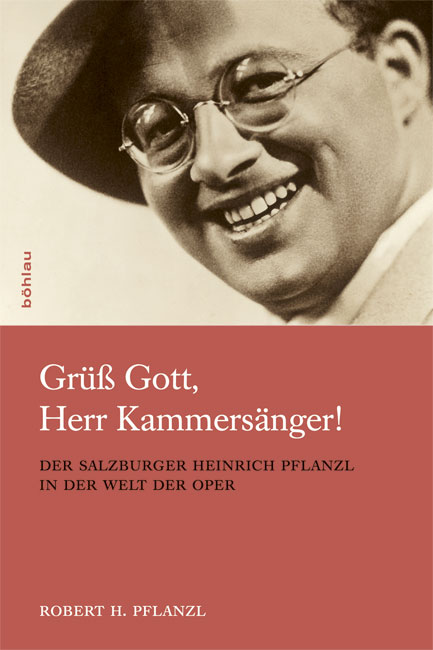
Der Salzburger Heinrich Pflanzl in der Welt der oper.
By Robert H. Pflanzl
Bohlau Verlag Wien 2012
Gruss Gott, Herr Kammersaenger!

Der Salzburger Heinrich Pflanzl in der Welt der oper.
By Robert H. Pflanzl
Bohlau Verlag Wien 2012
ISBN 978 – 3 – 205 – 78839 – 3
Often I derive most pleasure from reading the biographies of singers who weren’t worldstars yet somehow were as important for the opera business as the first-rank top singers. This book on Salzburg born bass Heinrich Pflanzl (1903-1978) is one of them.
Pflanzl studied at the Wiener Musikakademie. After his studies in 1929 he went to Bern and subsequently he sang in Breslau, Nurnberg, Kassel, Dresden and Berlin.
He made guest appearances in Bayreuth (1951-52), all over Germany but also in Paris, Barcelona, Prague, Strassbourg, Vienna.. and had great successes as Leporello, Rocco, Beckmesser and Ochs. From 1962 till 1973 he was a singing teacher at the Salzburger Mozarteum. His remarkable career which included around 150 (!) parts developed in the shade of the most dramatic events of the twentieth century: two world wars, the crisis of the 20-ies, the Nazi madness and the division of Germany and the Berlin Wall. This book was written by his son Robert who has been a stage director for many years and ultimately led the ‘Opernklasse’ at the Mozarteum in Salzburg. Written is perhaps the wrong word as it is not a biography in the usual sense. Pflanzl’s life has been reconstructed using the singers own diaries, letters, reviews, notes and interviews with comments and annotations by the son. I finished the book in three evenings and it should be made compulsory reading for every aspiring singer or for everyone interested in operatic history.
As a thread throughout the diary are the worries about money, getting engagements, getting certain roles, the competition (there is a certain envy towards Erich Kunz), theatre politics, the doubt, the loneliness, the intrigues, the constant problems with getting visas and the political climate in which he had to operate as a singing artist. One learns a lot about the opera trade in pre ànd post-war Germany. The book is loaded with fascinating stories, comments and anecdotes. Some of the most interesting include Roland Hayes who studied in Vienna at the same time (1925) as Pflanzl. But also Richard Mayer who was an example, mentor and friend, Max Reinhardt who wanted to lure the young Pflanzl into the straight theatre, the murder of Trajan Grosavecu (er sang Wunderschon) in 1927, von Manowarda, Gertrude Forstel, the adoration for Chaliapine (fights for entrance tickets broke out at the Vienna State Opera’s box office, Elmendorf, Rudolf Schock, Rudolf Bing, Karl Bohm, Fritz Soot (his second teacher), the Wagner brothers, painful comments on Karajan and much more.
While you get an excellent idea of how the opera world - in all of its aspects –worked under the Nazi regime Hitler or his henchmen are hardly mentioned.
Pflanlz in 1932 admits hope for the announced National Socialist revolution but a year later all that hope had already evaporated and the singer clearly distances himself from the new regime. Yet from 1933 till 1945 not one word of criticism or even on politics has been written down. So don’t expect a Victor Klemperer kind of diary for this period. It’s obvious Plfanzl realized but too well the extreme often life threatening danger in negative comments on the regime in his diaries, diaries he kept with him while travelling to his engagements. In June 1945 though from his sick-bed as a prisoner of war he cursed the regime which brought this misery over Europe. And here comes my only caveat : in 1934 Pflanzl had married Ulli Gradenwitz –an aspiring soubrette - whose Jewish father committed suicide in 1939 most likely to protect his family from further difficulties. Yet the author remains pretty much on the surface of this part of family history to say the least and leaves the reader with more questions than answers but otherwise this is one of the best opera related books I have read this year. The book has an appendix with all the roles Pflanzl sang, a chronology of his guest appearances and a discography of four pages. An index is included. Strongly recommended.
RvdB